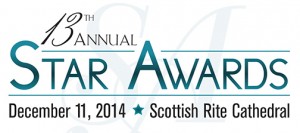The Indiana Society of Association Executives’ (ISAE) 13th annual STAR Awards banquet broke all past attendance records and also raised the highest amount of money for the silent auction charity recipient in the history of the event. The following tips were key for STAR Awards success:
- Pick emcees who know the industry. ISAE’s membership base is association professionals – this means our members work for trade, professional, fraternal and member-based organizations; because of this there are some very unique organization names and acronyms. We make sure our emcees (who both have been ISAE members for several years) know how to pronounce our winners’ names correctly. We also ask some of the previous year’s winners to present the individual awards; it makes the experience inclusive and meaningful. The last thing you want is to have a winner receive an award and have his/her name butchered.
- Use your committee. Your committee spent several months planning the event. They want to make the night go smoothly too, so recruit them to volunteer at registration, help usher/direct people, set up, etc. Just make sure they do not volunteer all night — they deserve to have time to network and enjoy the event too.
- Use your team. While everyone has a designated event planner, have your planner share information with the team. This leaves the planner free to handle details only he/she can handle, while other staff can manage other tasks like the registration desk or silent auction.
- Get feedback. We all send surveys after our events, but ISAE also does a wrap up call with our committee. We share the results of the survey with them and it is their time to provide feedback. As an organization you can use a wrap up call to show committee members how their ideas impacted the final event (they can see what worked or what failed). Also make sure that throughout the event you take notes of feedback from individuals. I keep an iPhone note open to jot down my own personal thoughts and also anything I hear from attendees. (You hope that everyone will fill out the survey but they won’t.) My personal notes also help me gauge what issues are actually issues: that night I noticed a small detail on the PowerPoint was not right; however, there was no mention of it in the survey.
- Think local for your silent auction charity recipient. If the proceeds of your silent auction go to a charity, think local and invite a representative. Your attendees will feel connected to the organization because it affects their community. Also, they get to meet someone from the charity in person and hear directly from him/her about how the donations will affect his/her work.
Do you have any other reliable event planning tips that have helped make your event successful?

